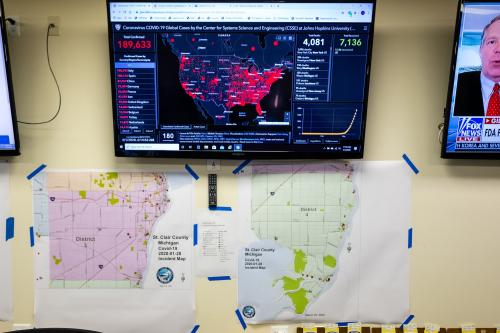For America to minimize the damage from the current pandemic, the media must inform, science must innovate, and our government must administer like never before. Yet decades of politically-motivated attacks discrediting all three institutions, taken to a new level by President Trump, leave the American public in a vulnerable position.
Trump has consistently vilified the national media. When campaigning, he called the media “absolute scum” and “totally dishonest people.” As president, he has called news organizations “fake news” and “the enemy of the people” over and over. The examples are endless. Predictably, he has blamed the coronavirus crisis on the media, saying “We were very prepared. The only thing we weren’t prepared for was the media.”
Science has been another Trump target. He has gutted scientific expertise and administrative capacity in the executive branch, most notably failing to fill hundreds of vacancies in the Centers for Disease Control itself and disbanding the National Security Council’s taskforce on pandemics. During the coronavirus crisis, he has routinely disagreed with scientific experts, including, in the AP’s words, his “musing about injecting disinfectants into people [to treat COVID-19].” This follows his earlier public advocacy for hydroxychloroquine as a COVID-19 treatment, also against leading scientists’ advice. Coupled with his flip-flopping on when to lift stay-at-home orders, the president has created confusion and endangered people.
Finally, President Trump has consistently demeaned essential government agencies, labeling them part of a “deep state,” such as when he “joked” about what he called “The Deep State Department.” Not surprisingly, he ignored another part of the supposed “deep state”—the intelligence community. Greg Miller and Ellen Nakashima reported in the Washington Post that Trump ignored repeated warnings about COVID-19 in his presidential daily brief in January and February. Throughout his presidency, unlike his predecessors, Trump has refused to read the daily brief.
The conservative movement’s project to degrade Americans’ trust and its collision with COVID-19
It is easy to think these are just examples of Trump’s unorthodox political style. Yet he is merely the apotheosis of a political approach that has animated much of the conservative movement for a half century or more: undermining trust in the media, science, and government.
Barry Goldwater and Richard Nixon made media criticism key to their communication strategies in the 1960s and early 1970s. Conservative talk radio in the 1990s and Fox News in the 2000s made it central to their business models. Indeed, criticism of establishment media is either the most or second-most frequent topic on Rush Limbaugh’s radio program. Fox News’ longtime slogan, “Fair and Balanced,” implicitly accused other news organizations of bias. Even though “Fair and Balanced” was officially dropped as the network slogan in 2017, criticism of the “mainstream media” is still a staple of Fox programming, especially on its prime-time opinion programs.
This history of attacks has eviscerated trust in the press, especially among Republicans. The General Social Survey (GSS) found that, in 1973, 13% of Democrats and 16% of Republicans had “hardly any” confidence in the press as an institution. By 2018, those numbers had increased to 28% of Democrats and a staggering 65% of Republicans.
Scientists have also taken it on the chin from many in the conservative movement. Whether it is skepticism of climate change, support for cuts in funding basic research, or hostility to universities in general, they have trained their rhetorical weapons on the scientific community with devastating effect. In the 1991 GSS, 47% of Republicans and only 32% of Democrats expressed “a great deal of confidence” in the “scientific community.” Yet by 2018, the parties had flipped: 50% of Democrats expressed a great deal of confidence, compared with only 39% of Republicans.
Finally and most importantly, the national government, because of its size, reach, and mission to keep Americans safe, will be essential in the fight against this pandemic. Unfortunately, it has been perhaps the conservative movement’s most consistent punching bag of all. In the 1986 words of President Ronald Reagan, the patriarch of modern conservatism, “The nine most terrifying words in the English language are, ‘I’m from the government, and I’m here to help.’”
Such attacks over many decades have succeeded. According to the American National Election Study, back in the 1960s, more than 70% of Americans trusted “the government in Washington to do what is right” either “most of the time” or “just about always.” In the last few decades, that percentage has regularly been in the teens and twenties.
Altogether, this three-pronged attack has produced a deeply partisan reaction to the greatest natural threat to humankind in 100 years. A recent Monmouth University poll found that less than 25% of Republicans were “very concerned” about someone in their family becoming seriously ill from coronavirus, compared to almost 60% of Democrats. Over 80% of Republicans said they were somewhat or very confident that the impact of coronavirus would be “limited,” compared to approximately 30% of Democrats. Several states, so far mostly led by Republican governors, such as Georgia, Tennessee and Florida, have already begun to lift their stay-at-home orders, in contradiction to the Trump administration’s own plan for opening up, which calls for states to have falling numbers of new COVID-19 cases for 14 days prior to reopening. Trump makes the problem worse by vacillating day-to-day between supporting his administration’s guidelines and supporting these governors.
Trump’s own distrust of government agencies, scientific experts, and information from the media may have contributed to his administration’s slow response to the crisis, as documented in detailed reports from the Washington Post, the New York Times, and 60 Minutes.
Why Americans’ trust is key to America’s success
American institutions are not perfect, of course. We all should want to improve scientific practices, remove bias from news coverage, and enhance the efficiency and effectiveness of government. But a crisis like the coronavirus pandemic highlights the exorbitant costs of undermining trust in media, science, and government for political gain.
People must believe the health advice that they are getting from the CDC and other government agencies who are fighting the crisis. People must receive (and trust) accurate information from major news organizations, rather than rely on rumors and news from fringe websites that their friends might share on social media. Even as states eventually lift stay-at-home orders, people will need to follow expert guidance, transmitted through the media, in order to prevent a resurgence of new cases.
This need not be a partisan topic. Many Republicans and conservatives over the years have been deeply respectful of government professionals, the findings of science, and non-partisan national journalists. But from the beginning of the conservative movement’s takeover of the Republican Party, which started with Barry Goldwater’s nomination in 1964, many in that movement have seen discrediting these institutions as a useful political strategy—a good way to win votes and gain media market share. But this political strategy can have catastrophic consequences when those very institutions are the key to protecting public health and saving lives.
Calling out this long-running, cynical, and ultimately corrosive approach to politics is long overdue. Politicians and media personalities can pursue conservative policies without undermining the public’s trust in the media, science, and government agencies. Now more than ever, they should do that.







Commentary
Destroying trust in the media, science, and government has left America vulnerable to disaster
May 1, 2020